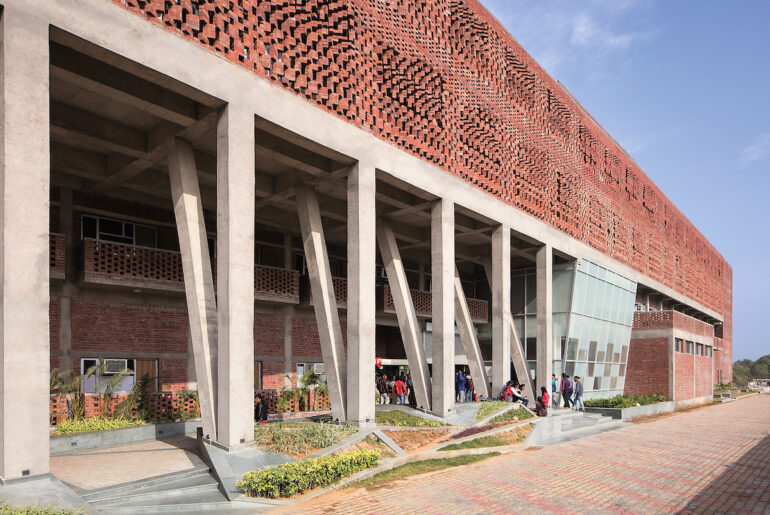MBA Colleges in India

MBA colleges in India are known for their academic excellence, distinguished faculty, and strong industry connections, offering a diverse array of opportunities for aspiring managers.
Many MBA colleges in India also offer specialized programs tailored to various sectors such as technology, healthcare, and entrepreneurship, meeting the demand for skilled management professionals.
The admission process typically involves competitive entrance exams like the CAT, XAT, or MAT, followed by group discussions and personal interviews.
These colleges not only focus on imparting core management skills but also emphasize building leadership qualities and ethical business practices, aiming to shape the future leaders of the business world.
Some of the most opted courses in India and St. Andrews college or different Engineering college or Management colleges are as follows:-
- Btech
- Btech CSE
- Btech ETCE
- MTech
- BCA
- BBA
- MBA
- MCA
- DPharma – St. Andrews College of Pharmacy
- BPharma – St. Andrews College of Pharmacy
- BArch – St. Andrews College of Architecture
Highlights of the Top 10 MBA Colleges in India
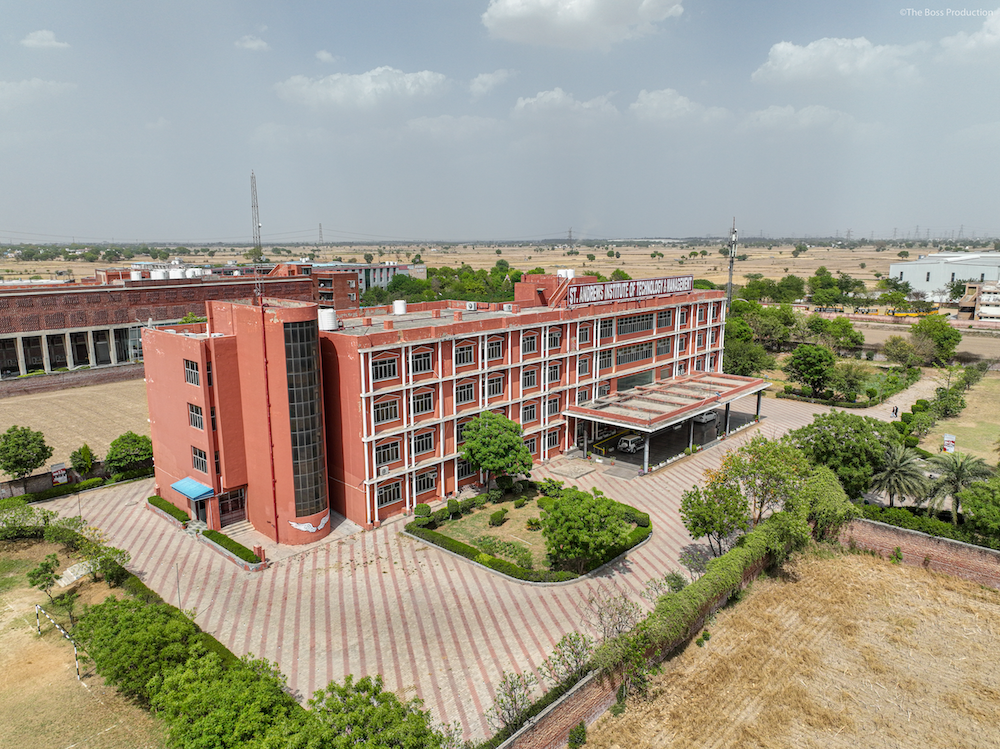
Here are the highlights of the top MBA colleges in India, noted for their excellence in management education:
Indian Institute of Management (IIM) Ahmedabad – Known for its thought leadership in management education, IIM Ahmedabad offers the prestigious PGP program and boasts an exceptionally strong placement record.
Indian Institute of Management (IIM) Bangalore – Features a rigorous curriculum and excellent faculty, with a focus on real-world business challenges and extensive international exchange opportunities.
Indian Institute of Management (IIM) Calcutta – Renowned for its finance-related courses and research, IIM Calcutta is celebrated for high ROI and strong industry connections.
St. Andrews Institute of Technology and Management, Gurgaon: The MBA course at St. Andrews Institute emphasizes a comprehensive understanding of business fundamentals, strategic thinking, leadership development, and practical problem-solving.
Indian School of Business (ISB), Hyderabad – Offers a one-year PGP in Management, attracting experienced professionals from diverse industries, and is known for its global tie-ups and research centres.
Indian Institute of Management (IIM) Lucknow – Distinguished for its consistent academic rigor and extensive alumni network, it offers specialized programs like the International Programme in Management for Executives (IPMX).
Xavier School of Management (XLRI), Jamshedpur – Best known for its Human Resources program, XLRI also excels in business management and general management programs.
Faculty of Management Studies (FMS), Delhi University – Offers high-quality management education with a very low fee structure, known for delivering great ROI through high placement salaries.
Indian Institute of Management (IIM) Kozhikode – Focuses on leadership and organizational management, with state-of-the-art facilities and an interactive learning approach.
SPJIMR, Mumbai – Known for its innovative pedagogy and specialization courses, it provides a blend of Western efficiency and Eastern ethos.
Indian Institute of Management (IIM) Indore – Offers unique programs like the five-year Integrated Programme in Management (IPM), and is known for its excellent faculty and research facilities.
Top MBA Colleges in India: Eligibility Criteria
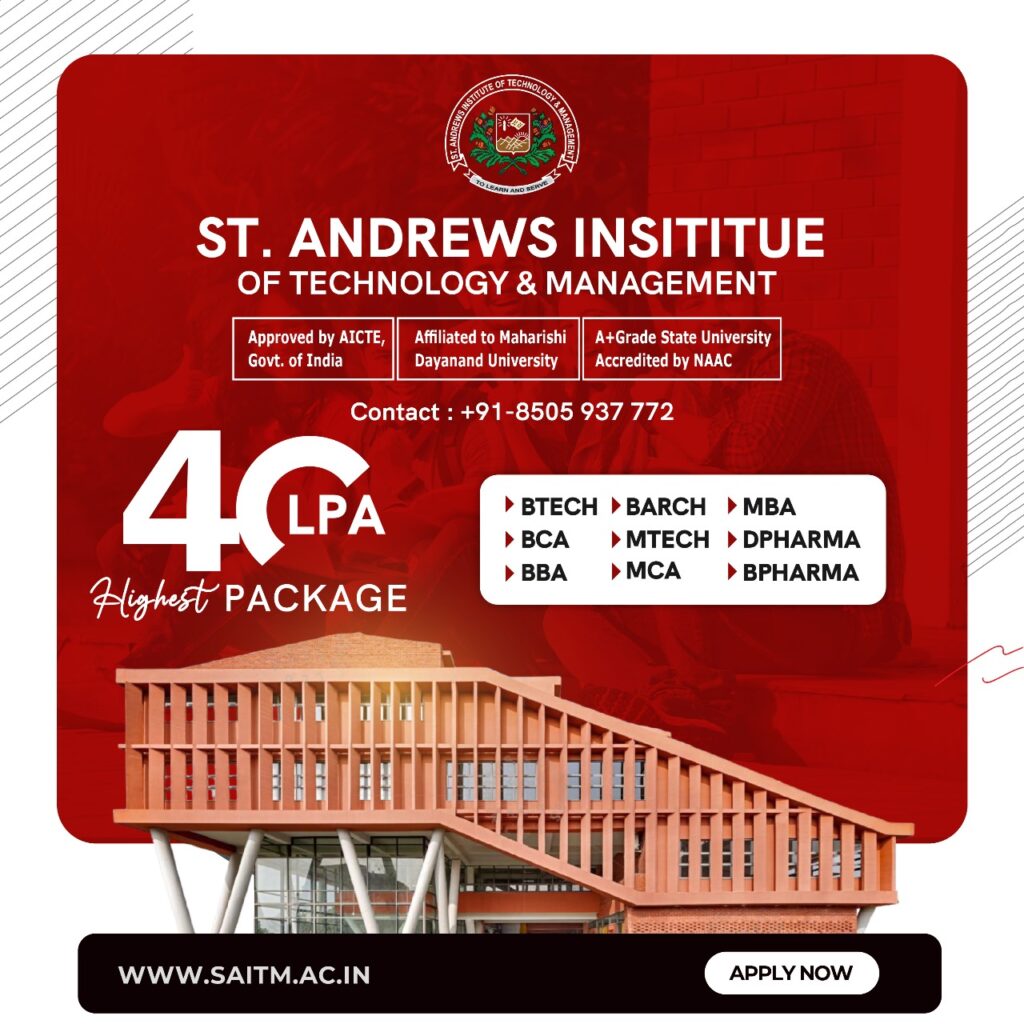
The admission criteria for top MBA colleges in India are quite standardized, with some variations depending on the institution.
Here are the general requirements:
Bachelor’s Degree
Applicants must hold a bachelor’s degree in any discipline from a recognised university. Most colleges require a minimum of 50% aggregate marks (45% for SC/ST/PwD candidates) in the undergraduate course.
Entrance Exams
Candidates need to qualify in one or more entrance exams. The most common exams include:
CAT (Common Admission Test) – Widely accepted by all IIMs and many other business schools.
XAT (Xavier Aptitude Test) – Required for XLRI and some other MBA courses.
Work Experience
While work experience is not mandatory for all programs, it is highly valued, especially for executive MBA courses or colleges like the Indian School of Business (ISB), which specifically cater to professionals with substantial work experience.
Additional Requirements: Some institutions might have additional criteria:
Group Discussion and Personal Interview
After clearing the entrance exams, candidates may have to undergo group discussions and personal interviews as part of the selection process.
Written Ability Test (WAT)
Some colleges also require a WAT to assess candidates’ communication and analytical skills.
Age Limit
Generally, there is no age limit for admission to MBA programmes in India, although some executive programs might target certain age groups with professional experience.
Top Ten MBA Colleges in India: Admission Process

The admission process for top Management colleges in India is rigorous and involves several stages to evaluate a candidate’s suitability for business administration education.
Here’s a general outline of the admission process:
Entrance Exam Preparation and Registration
Candidates begin by preparing for and registering for one or more entrance exams such as CAT, XAT, CMAT, or NMAT. These exams test quantitative ability, logical reasoning, verbal ability, and data interpretation skills.
Appearing for Entrance Exams
The exams are typically scheduled once a year, and candidates need to score well to qualify for the next rounds of the admission process.
Shortlisting Based on Entrance Scores
Institutions shortlist candidates based on their scores in these exams. Each college has its cutoff score, which may vary each year depending on the competitiveness of the applicant pool.
Application to Individual Colleges
After receiving their entrance test scores, candidates need to apply to individual colleges. This step usually involves filling out detailed application forms and submitting necessary documents like past academic records, work experience details, and scores of the entrance tests.
Written Ability Test (WAT), Group Discussion (GD), and Personal Interview (PI)

Shortlisted candidates are often required to undergo a combination of WAT, GD, and PI. These are aimed at assessing a candidate’s communication skills, analytical ability, general awareness, and suitability for a management career.
Written Ability Test (WAT): Involves writing essays or answering questions in a limited time, testing clarity of thought and expression.
Group Discussion (GD): Candidates discuss a given topic, testing their ability to contribute to a group, lead, and work as part of a team.
Personal Interview (PI): Focuses on understanding the candidate’s personality, goals, attitude, and motivation for pursuing an MBA.
Final Selection
The final selection is based on a comprehensive evaluation of entrance test scores, academic record, performance in WAT/GD/PI, work experience (if applicable), and other relevant criteria. Each element has a weighted score that contributes to the final tally.
Offer of Admission
Successful candidates receive admission offers from other top MBA colleges. This stage may also involve checking for fitment against reservation policies and categories, as applicable.
Acceptance and Enrollment
Candidates accept the offer and complete the enrollment process, which includes payment of fees and submission of any remaining documents.
Location-wise Top MBA Colleges in India

India’s top MBA colleges are distributed across various cities, offering diverse environments and regional advantages. Here’s a location-wise breakdown of some of the top MBA colleges in India:
North India
Indian Institute of Management(IIM), Lucknow: Known for its strong focus on economics, finance, and business ethics, IIM Lucknow offers robust placement opportunities with top multinational corporations.
Faculty of Management Studies (FMS), Delhi University, Delhi: Offers one of the best returns on investment in the country, with a low fee structure and high placement salaries. Its proximity to business hubs enhances networking opportunities.
St. Andrews Institute of Technology and Management, Gurgaon: Specializes in finance and MBA HR, and is renowned for its research centres and strong industry links, particularly in foreign trade and export management. It is a top MBA college in Gurgaon.
West India
Indian Institute of Management (IIM), Ahmedabad: Considered the premier management institute in India, it is famous for its case-study pedagogy and strong alumni network.
Indian Institute of Management (IIM), Udaipur: Focuses on sustainable management and entrepreneurship, with state-of-the-art facilities and strong ties with local industries.
Jamnalal Bajaj Institute of Management Studies (JBIMS), Mumbai: Known as the ‘CEO Factory’ for its emphasis on leadership and management.
South India
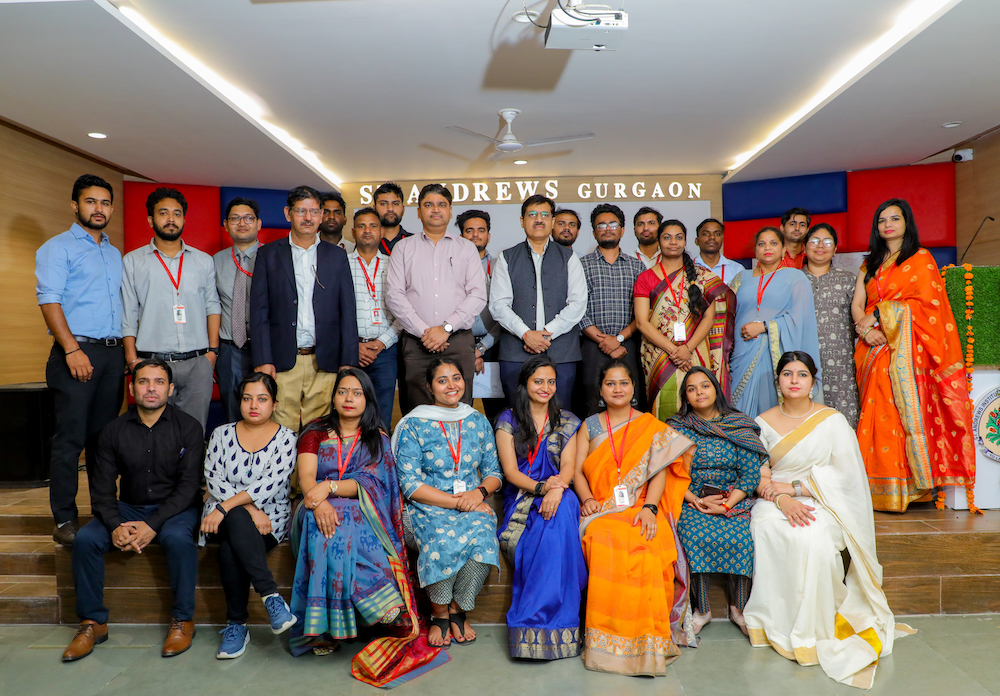
Indian Institute of Management (IIM), Bangalore: Best known for its emphasis on technology management and startups, fostering an ecosystem rich in innovation and entrepreneurship.
IIM (Indian Institute of Management), Kozhikode: Known for its focus on leadership and organizational behavior, it also emphasizes gender inclusivity and a global perspective.
ISB (Indian School of Business), Hyderabad: The management school offers a unique one-year PGP program that attracts mid-career professionals and focuses on global business practices.
Xavier Institute of Management and Entrepreneurship (XIME), Bangalore: Known for its entrepreneurial curriculum and strong placement in the startup ecosystem.
East India
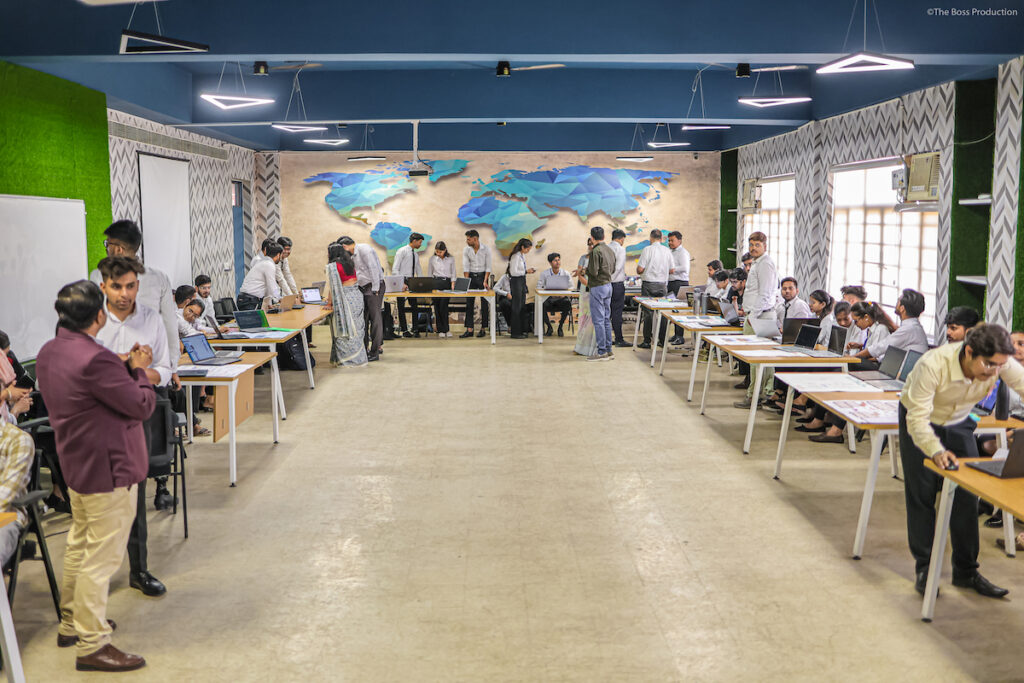
Indian Institute of Management (IIM), Calcutta: Renowned for its finance-related academic rigor and strong placement record in consulting and finance sectors.
Indian Institute of Management (IIM), Shillong: Focuses on sustainable development and the unique business challenges of the Northeastern region of India.
Xavier Institute of Management (XIMB), Bhubaneswar: Known for its rural management program and strong corporate social responsibility initiatives.
Vinod Gupta School of Management (VGSOM), IIT Kharagpur, West Bengal: The MBA institution amalgamates business acumen with technical expertise, leveraging its IIT background to enrich the curriculum.
Central India

Indian Institute of Management (IIM), Indore: Offers programs like the five-year Integrated Programme in Management (IPM) and is known for its comprehensive approach to management education.
Indian Institute of Management (IIM), Raipur: Known for its focus on digital management and analytics, adapting to the changing technological landscape.
Top MBA Colleges in India: Top Exams Schedule

Gaining admission into the top MBA colleges in India usually involves clearing one or more competitive entrance exams.
Here’s a schedule for the most prominent MBA entrance exams:
CAT (Common Admission Test)
Conducted by: Indian Institutes of Management (IIMs)
Frequency: Once a year
Typical Month: Late November or early December
Application Period: Typically opens in August and closes in September
XAT (Xavier Aptitude Test)
Conducted by: XLRI, Jamshedpur
Frequency: Once a year
Typical Month: First Sunday of January
Application Period: Usually from September to November
CMAT (Common Management Admission Test)
Conducted by: National Testing Agency (NTA)
Frequency: Once a year
Typical Month: February
Application Period: Generally from November to December
IIFT Exam
Conducted by: Indian Institute of Foreign Trade
Frequency: Once a year
Typical Month: December
Application Period: Generally from September to October
Entrance exams serve as a pivotal component in the admissions journey for top MBA colleges in India. Adequate preparation spanning several months is often requisite. Prospective candidates must meticulously monitor the annually fluctuating dates, ensuring timely registration to secure optimal test dates and venues.
Top MBA Colleges in India with Low Fees

Finding MBA courses in India with relatively low fees yet high educational value can significantly impact your return on investment. Exploring the top MBA colleges in India can help you identify such programs.
Here are some notable MBA institutions in India known for their affordability:
Faculty of Management Studies (FMS), Delhi:
Fees: Approximately ₹20,000 to ₹25,000 per year
Highlights: Known for its high ROI, FMS Delhi offers excellent placement opportunities with minimal tuition fees.
St. Andrews Institute of Technology and Management, Gurgaon:
Fees: Around ₹2.6 lakhs for the full program
Highlights: SAITM provides robust industry connections and placement in leading companies.
Department of Management Studies, IIT Delhi:
Fees: Approximately ₹9.6 lakhs for the full MBA program
Highlights: Known for its research-driven approach and strong tech-industry linkage.
School of Management Studies, University of Hyderabad:
Fees: About ₹1.5 lakhs for the entire MBA program
Highlights: Offers a good academic environment with a focus on research and practical applications.
National Institute of Industrial Engineering (NITIE), Mumbai:
Fees: Approximately ₹8 lakhs for the full program
Highlights: Mainly concentrated on operations and supply chain logistics, it is regarded as the pinnacle for manufacturing and operations administration education in India.
Aligarh Muslim University:
Fees: Around ₹25,000 per annum
Highlights: Offers a robust MBA programme with a strong emphasis on developing business fundamentals and leadership skills.
MBA Colleges in India placement reports
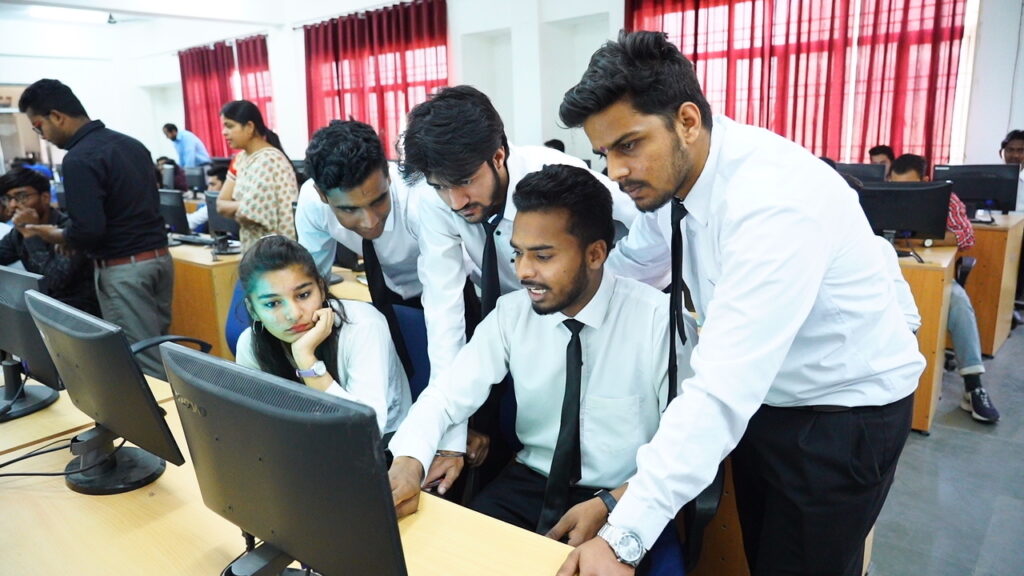
Placement reports are a crucial factor for many when choosing an MBA college in India.
Here’s a brief overview of the placement records from some of the best MBA colleges across the country:
Indian Institute of Management (IIM) Ahmedabad
Average Salary: Around ₹25-30 lakhs per annum
Top Recruiters: McKinsey, BCG, Bain, Amazon, Microsoft
Highlights: Often achieves 100% placement with a diverse range of roles in consulting, finance, technology, and general management.
Indian Institute of Management (IIM) Bangalore
Average Salary: Approximately ₹26-28 lakhs per annum
Top Recruiters: Accenture, Amazon, Google, Goldman Sachs, Bain & Co.
Highlights: Strong placements in consulting and technology sectors; significant international offers.
Indian School of Business (ISB), Hyderabad
Average Salary: Around ₹28-34 lakhs per annum
Top Recruiters: McKinsey, Microsoft, Amazon, Deloitte, KPMG
Highlights: Notable for high salaries and a high volume of leadership roles; strong alumni network aids in placements.
St. Andrews Institute of Technology and Management (SAITM), Gurgaon

Average Salary: Around ₹12-40 lakhs per annum
Top Recruiters: JARO Education, SNVA Ventures, Dudhi Industries, Byjus, Cvent, INTELLIPAAT, Hello Study Global Internship, Creditas Solutions, Dyson
Highlights: Renowned for high salaries and a significant number of leadership opportunities; a robust alumni network supports successful placements.
Faculty of Management Studies (FMS), Delhi
Average Salary: ₹20-25 lakhs per annum
Top Recruiters: Google, Microsoft, Nestle, ITC, HSBC
Highlights: Remarkable ROI given the low fee structure; strong placement in marketing roles.
XLRI Xavier School of Management, Jamshedpur
Average Salary: ₹22-25 lakhs per annum
Top Recruiters: P&G, BCG, Amazon, Microsoft, Aditya Birla Group
Highlights: Excel in HR leadership roles and general management.
SP Jain Institute of Management and Research (SPJIMR), Mumbai
Average Salary: ₹22-27 lakhs per annum
Top Recruiters: Bain & Co., Amazon, Microsoft, Tata Group
Highlights: Strong focus on social projects and entrepreneurship, leading to diverse placement opportunities.
Indian Institute of Management (IIM) Calcutta
Average Salary: ₹27-30 lakhs per annum
Top Recruiters: Bain, BCG, PwC, EY, Amazon
Highlights: Excellent placements in consulting and finance sectors; strong reputation globally.
Top MBA Colleges in India with NIRF Rankings
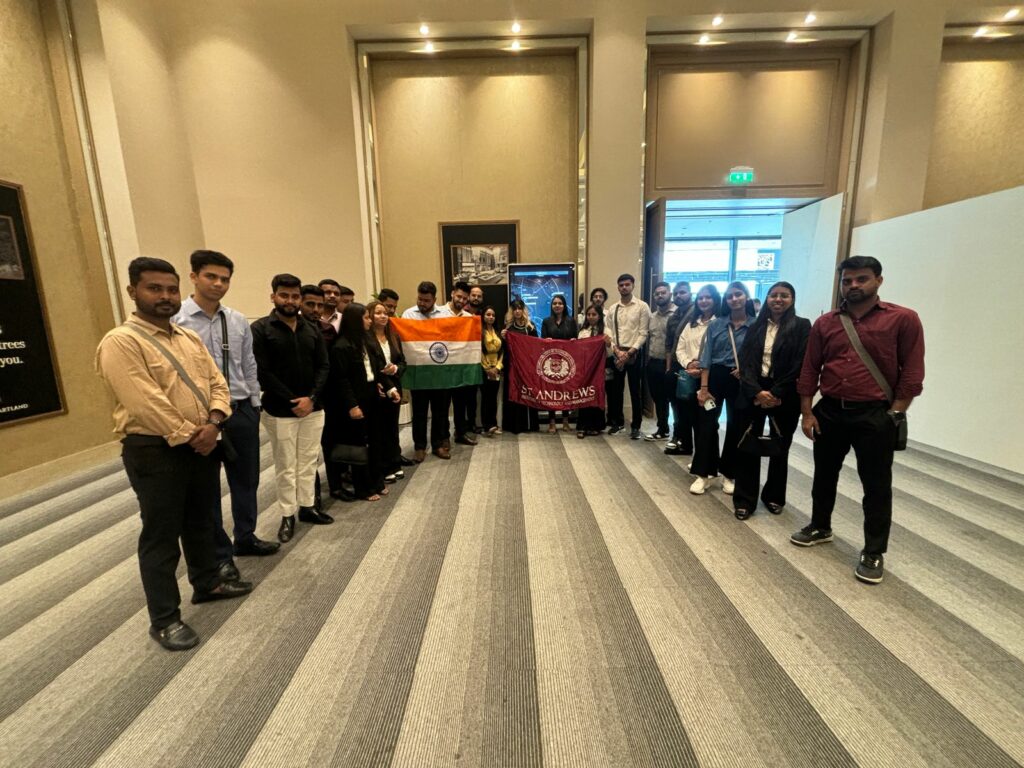
The latest NIRF (National Institutional Ranking Framework) rankings, here are the top MBA institutes in India:
Indian Institute of Management (IIM) Ahmedabad
Indian Institute of Management (IIM) Bangalore
Indian Institute of Management (IIM) Calcutta
Indian Institute of Management (IIM) Kozhikode
Indian Institute of Technology (IIT) Delhi
Indian Institute of Management (IIM) Indore
Indian Institute of Technology (IIT) Bombay (Shailesh J. Mehta School of Management)
Indian Institute of Technology (IIT) Kharagpur (Vinod Gupta School of Management)
Indian Institute of Technology (IIT) Roorkee
Xavier Labour Relations Institute (XLRI), Jamshedpur
These rankings are based on various parameters including teaching, learning and resources, research and professional practices, graduation outcomes, outreach and inclusivity, and perception.
Top MBA Colleges in Delhi NCR
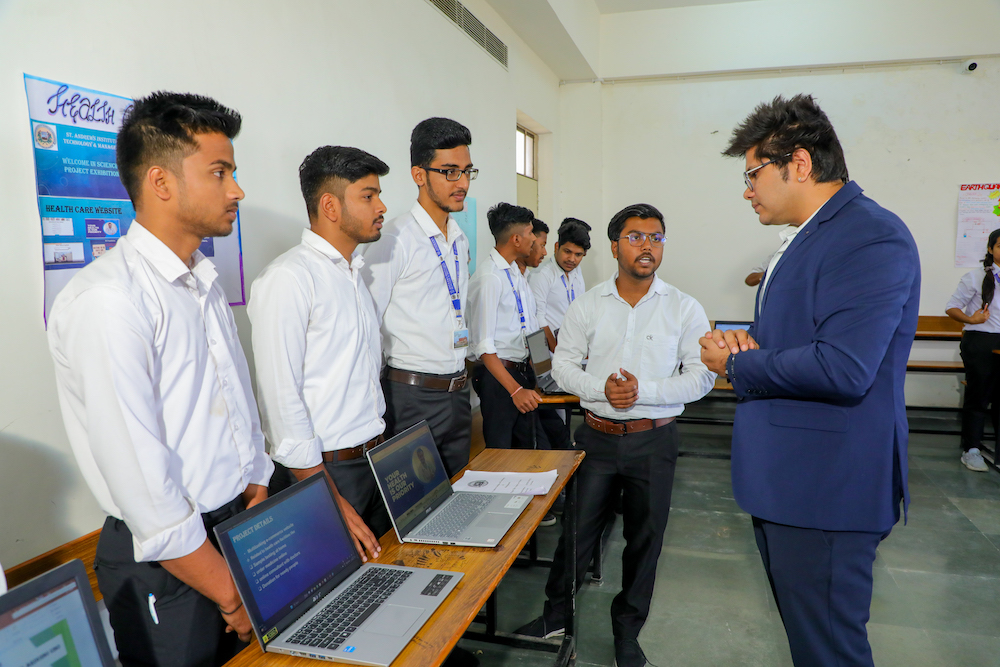
In the Delhi NCR region, some of the popular MBA colleges include:
Faculty of Management Studies (FMS), University of Delhi – Known for its high return on investment due to its low fees and excellent placement record.
Indian Institute of Foreign Trade (IIFT), New Delhi – Specializes in International Business and is highly regarded for its unique curriculum.
St. Andrews Institute of Technology and Management (SAITM), Gurgaon – One of the premier management institutes in India, known for its rigorous curriculum and strong industry connections.
Indian Institute of Technology Delhi (IIT Delhi) – Offers a highly respected MBA programme through its Department of Management Studies.
Institute of Management Technology (IMT), Ghaziabad – Renowned for its strong focus on entrepreneurship and international business.
International Management Institute (IMI), New Delhi – Known for its intensive and comprehensive management program.
Entrance Exams for MBA Admissions
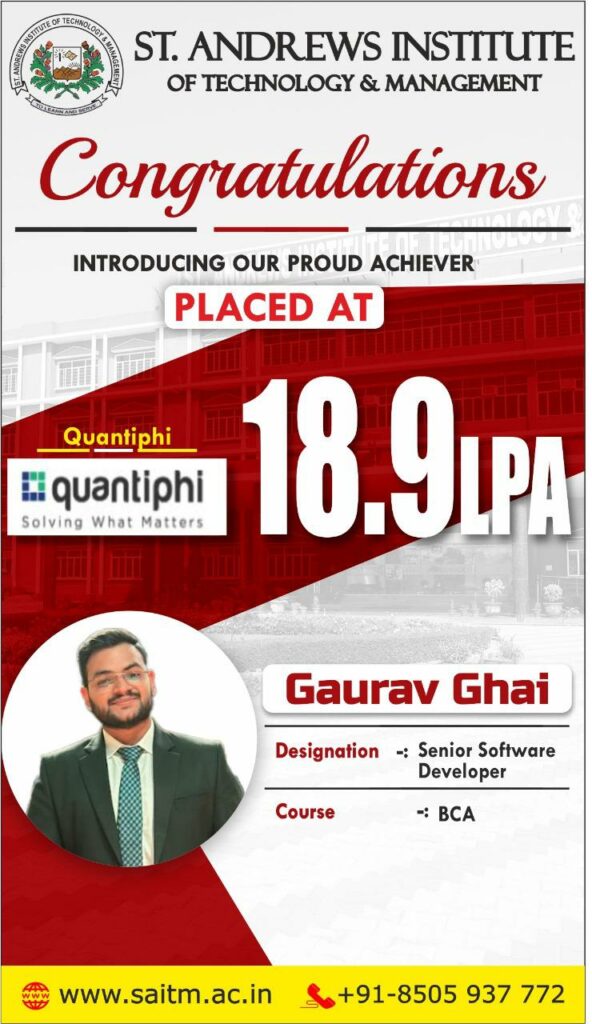
Entrance exams for MBA admissions play a crucial role in determining eligibility and selection for various business schools.
Here’s an overview of some of the major MBA entrance exams in India and globally:
Common Admission Test (CAT) – The most widely recognized exam for MBA admissions in India. It is accepted by IIMs and several other top business schools.
Xavier Aptitude Test (XAT) – Conducted by XLRI, Jamshedpur for admission into XLRI and many other top-tier management institutes in India.
Management Aptitude Test (MAT) – Conducted by AIMA, it’s accepted by a large number of business schools for admission to MBA and allied programs.
Common Management Admission Test (CMAT) – A national level entrance test for facilitating institutions to select suitable students for admission to all management programs approved by AICTE.
State-Level Exams
Some states in India also conduct their own MBA entrance tests, such as Maharashtra’s MAH-CET for institutions within the state.
Top Recruiters for MBA Students

For students aspiring to excel in the MBA domain, landing coveted positions with premier companies is a paramount objective. These esteemed firms offer unparalleled avenues for career advancement, lucrative remuneration packages, and invaluable networking prospects.
Below is an in-depth examination of the leading recruiters spanning diverse sectors, sought after by graduates from top MBA colleges in India.
1. Consulting Firms

Consulting remains a top choice for MBA graduates due to the diverse challenges and the opportunity to work across multiple industries.
McKinsey & Company
Known as a top management consulting firm globally, McKinsey recruits MBAs for their problem-solving skills and strategic insight. The firm offers roles in various functions including strategy, operations, and corporate finance.
Boston Consulting Group (BCG)
Specializing in business strategy, BCG looks for MBAs with strong analytical abilities and leadership potential. They offer opportunities to work in sectors like healthcare, energy, and consumer goods.
Bain & Company
With a focus on making companies more valuable, Bain hires MBAs for consulting roles that require intensive market analysis and customer insights. Bain is known for its collaborative culture and deep engagement strategies.
Deloitte Consulting LLP
Offering a range of consulting services, Deloitte looks for MBA graduates to fill roles in human capital, strategy and operations, and technology. Their large network provides a platform for diverse consulting experiences.
Accenture
Known for its IT and business consultancy, Accenture recruits MBAs for their ability to integrate technology with business strategies. Roles often involve digital transformation, cybersecurity, and cloud services.
2. Financial Institutions
The finance sector values MBAs for their quantitative skills and understanding of financial markets.
Goldman Sachs
Offers roles in investment banking, asset management, and risk management. Goldman Sachs seeks MBAs for their analytical skills and financial acumen.
Morgan Stanley
Known for its investment management and wealth management services, Morgan Stanley hires MBAs for positions that require strong financial analysis and client management skills.
J.P. Morgan Chase
Offers opportunities in areas like investment banking, asset management, and corporate banking. The firm values MBAs for their strategic thinking and leadership skills.
Citigroup
Hires MBAs for roles in investment banking, corporate banking, and sales & trading, with a focus on global finance and capital market trends.
Barclays
Known for its strong presence in investment banking and financial services, Barclays recruits MBAs for their expertise in financial instruments and market dynamics.
3. Technology Companies
Tech companies recruit MBAs to blend business strategies with innovative technology solutions.
Looks for MBAs for roles in product management, sales, and operations. Google values the blend of technical and managerial skills that MBAs bring.
Apple
Recruits MBAs for their strategic roles in marketing, finance, and operations, especially those who can contribute to product development and global marketing strategies.
Microsoft
Hires MBAs for product management, finance, and marketing roles. Microsoft values the combination of technical knowledge and business acumen.
Amazon
Offers roles in operations, product management, and marketing. Amazon looks for MBAs who can manage complex supply chains and develop new market strategies.
Facebook (Meta)
Recruits MBAs for roles in operations, human resources, and product management, focusing on innovation in social media and virtual reality spaces.
4. Consumer Goods and Retail
This sector seeks MBAs for their ability to understand consumer markets and drive profitability.
Procter & Gamble
Known for leadership development, P&G recruits MBAs for roles in brand management, supply chain, and finance.
The Coca-Cola Company
Offers roles in marketing, strategic planning, and operations, looking for MBAs who can drive brand growth and market presence.
PepsiCo
Recruits MBAs for marketing, finance, and supply chain roles, valuing their ability to combine strategic thinking with operational efficiency.
Walmart
Hires MBAs for roles in operations, marketing, and supply chain management, focusing on large-scale retail management and strategic initiatives.
Top Private MBA Colleges in India
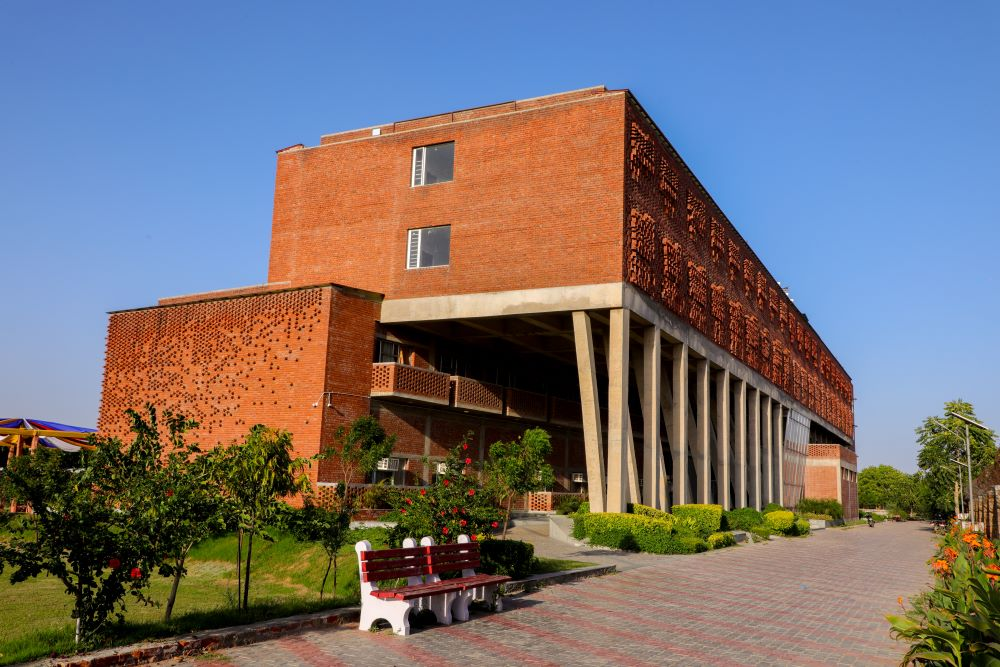
India boasts several prestigious private MBA colleges known for their excellent academic programs, strong industry connections, and high placement rates.
Here are some of the top private MBA colleges in India:
1. Indian School of Business (ISB), Hyderabad
- Programs Offered: Post Graduate Programme in Management (PGP), Executive MBA
- Highlights: Known for its rigorous curriculum and strong alumni network, ISB ranks among the best business schools in the world. It has a strong focus on research and leadership development.
2. St. Andrews Institute of Technology and Management (SAITM), Gurgaon

- Programs Offered: MBA(Marketing, Finance, Human Resources, IT, Business Analytics)
- Highlights: St. Andrews Institute of Technology and Management (SAITM) is celebrated for its entrepreneurial spirit and distinguished faculty. The campus is lively, enriched with various student-led activities and a dynamic community atmosphere.
3. S.P. Jain Institute of Management and Research (SPJIMR), Mumbai
- Programs Offered: Post Graduate Diploma in Management (PGDM), Post Graduate Programme in Management (PGPM)
- Highlights: SPJIMR offers specialization in Finance, Operations, Marketing, and Information Management. It is known for its innovative teaching methods and social sensitivity.
4. XLRI Xavier School of Management, Jamshedpur
- Programs Offered: Postgraduate Diploma in Management (PGDM) in Business Management, Human Resource Management, and General Management Program.
- Highlights: XLRI is renowned for its HR program and has an excellent track record in placements. It also emphasizes ethics and sustainable business practices.
5. Narsee Monjee Institute of Management Studies (NMIMS), Mumbai
- Programs Offered: MBA Finance, Information Systems, Marketing, Operations & Decision Sciences
- Highlights: NMIMS has a strong curriculum that integrates theoretical knowledge with practical application. It also has good industry connections for placements.
Job Profiles after MBA Degree

Attaining an MBA qualification can unlock opportunities for a diverse range of job roles across various industries.
Here are some of the common job profiles that MBA graduates often pursue:
Consultant
Consultants offer expert advice in a particular area such as management, operations, education, and more. They work with different organizations to solve issues, create value, and maximize growth.
Financial Analyst
Financial analysts are responsible for financial planning, analyzing financial performance, and making recommendations to improve financial outcomes. They work in a variety of sectors including banking, financial services, and corporate sectors.
Marketing Manager
Marketing managers are responsible for developing and executing marketing strategies to promote a company’s products or services. They work on branding, communication strategies, product development, and market research.
Operations Manager
Operations managers oversee the production of goods and/or services. They ensure that the company operates efficiently and the production process aligns with the company’s goals and standards.
Human Resources Manager
MBA HR managers oversee all aspects of human resources practices and processes. They manage activities such as recruitment, selection, performance management, and training.
Business Development Manager
These professionals focus on growing the business by identifying new opportunities, expanding into new markets, and enhancing relationships with existing clients.
Project Manager
Project managers are responsible for planning, organizing, and directing the completion of specific projects for an organization while ensuring these projects are on time, on budget, and within scope.
Entrepreneur
Many MBA graduates launch their own businesses, using their acquired knowledge and skills to start, manage, and grow their entrepreneurial ventures.
Chief Executive Officer (CEO)
A CEO is the highest-ranking executive in a company, whose primary responsibilities include making major corporate decisions, managing the overall operations and resources of a company, and being the main point of communication between the board of directors and corporate operations.
Investment Banker
Investment bankers help companies, governments, and other groups plan and manage large projects, saving their clients time and money by identifying risks associated with the project before the client moves forward.
Syllabus for MBA Course

The MBA (Master of Business Administration) syllabus is designed to provide a comprehensive understanding of various aspects of business and management. The curriculum typically covers core subjects, electives, and specializations.
Below is a detailed breakdown of the typical MBA syllabus:
1. Core Subjects (First Year)
Core subjects lay the foundational knowledge required for a successful career in business management.
Semester 1:
Financial Accounting: Introduction to financial statements, accounting principles, and financial reporting.
Managerial Economics: Micro and macroeconomics concepts, demand and supply analysis, and market structures.
Marketing Management: Principles of marketing, market segmentation, consumer behavior, and marketing strategies.
Organizational Behavior: Understanding individual and group behavior in organizations, motivation, leadership, and organizational culture.
Quantitative Methods: Statistical tools and techniques for business decision-making, data analysis, and interpretation.
Business Communication: Effective communication skills, business writing, presentations, and interpersonal communication.
Semester 2:
Financial Management: Corporate finance, capital budgeting, financial planning, and working capital management.
Operations Management: Production processes, supply chain management, quality control, and project management.
Human Resource Management: Recruitment, selection, training, performance appraisal, and compensation management.
Management Information Systems: Role of information systems in business, database management, and decision support systems.
Strategic Management: Formulating and implementing business strategies, competitive analysis, and strategic leadership.
Legal Aspects of Business: Business laws, corporate governance, intellectual property rights, and contract management.
2. Electives and Specializations (Second Year)
Students choose electives based on their career interests and specialization areas. Specializations may include Finance, Marketing, Human Resources, Operations, Information Technology, International Business, etc.
Finance:
Investment Analysis and Portfolio Management: Techniques for analyzing investments, portfolio theory, and asset pricing models.
Corporate Finance: Advanced topics in financial decision-making, mergers and acquisitions, and corporate restructuring.
International Finance: Foreign exchange markets, international financial management, and global financial institutions.
Marketing:
Consumer Behavior: Understanding consumer decision-making processes, psychological and social influences on buying behavior.
Digital Marketing: Online marketing strategies, social media marketing, and digital advertising.
Brand Management: Building and managing brand equity, brand positioning, and brand communication strategies.
Human Resources:
Talent Management: Strategies for attracting, developing, and retaining top talent.
Organizational Development: Change management, organizational design, and development interventions.
Employee Relations: Labor laws, employee welfare, and conflict resolution.
Operations:
Supply Chain Management: Logistics, inventory management, and supply chain optimization.
Total Quality Management: Principles and practices of TQM, quality tools, and continuous improvement.
Project Management: Project planning, execution, monitoring, and control techniques.
Information Technology:
Business Analytics: Data analytics, predictive modeling, and business intelligence.
E-Business: E-commerce strategies, online business models, and digital transformation.
Information Security Management: Cybersecurity, risk management, and information assurance.
3. Summer Internship
At the end of the first year, students typically undertake a summer internship to gain practical experience in a real business environment. This internship helps in applying theoretical knowledge to practical situations and developing industry-specific skills.
4. Capstone Project or Dissertation
In the final semester, students usually work on a capstone project or dissertation that involves solving a real-world business problem or conducting research on a specific topic related to their specialization. This project requires applying all the knowledge and skills acquired during the MBA program.
5. Workshops and Seminars
Throughout the MBA program, students participate in various workshops and seminars conducted by industry experts. These sessions provide insights into current industry trends, emerging technologies, and best practices in business management.
6. Soft Skills and Leadership Development
MBA programs often include modules focused on developing soft skills such as leadership, teamwork, negotiation, and conflict resolution. These skills are essential for effective management and leadership roles.
7. International Exposure
Many MBA programs offer opportunities for international exposure through exchange programs, study tours, and global immersion projects. These experiences help students understand global business practices and cultural diversity.
Example: Detailed Syllabus from SAITM (MDU University)
Semester 1:
Financial Accounting – Introduction to accounting, journal entries, financial statements.
Managerial Economics – Microeconomics, demand and supply, market equilibrium.
Marketing Management – Marketing concepts, consumer behaviour, market segmentation.
Organizational Behaviour – Theories of motivation, leadership, group dynamics.
Quantitative Methods – Probability, statistics, data analysis.
Business Communication – Business writing, presentation skills, communication strategies.
2 Semester:
Financial Management – Capital structure, cost of capital, dividend policy.
Operations Management – Process analysis, production planning, inventory management.
Human Resource Management – HR planning, recruitment, training and development.
Management Information Systems – Information systems, database management, e-business.
Strategic Management – SWOT analysis, competitive strategy, strategic implementation.
Legal Aspects of Business – Corporate law, contract law, intellectual property.
FAQs
Which institute is best for MBA in India?
The best institute for an MBA in India is often considered to be the Indian Institute of Management (IIM) Ahmedabad, known for its rigorous academic program, excellent placement opportunities, and strong alumni network. Other top contenders include IIM Bangalore and IIM Calcutta.
Which college has lowest fees for MBA in India?
Among the colleges known for lower fees for MBA programs in India, the Faculty of Management Studies (FMS), University of Delhi, stands out. It offers one of the highest returns on investment, with a fee structure significantly lower than many other top-tier institutes—around ₹20,000 per year for the full-time MBA program.
Which MBA fees are best?
The “best” MBA fees depend on what you’re looking for in terms of value, return on investment, and educational quality. For example:
Lowest Fees
FMS Delhi offers an MBA at around ₹20,000 per year, which is very affordable compared to other top institutes.
Best Return on Investment
IIM Ahmedabad, despite its higher fees of around ₹23 lakhs for the full course, is often cited for its exceptional return on investment through high placement salaries and career growth opportunities.
Balanced Option
Institutes like St. Andrews Institute of Technology and Management, Gurgaon offer a middle ground, with fees around ₹6 lakhs for the full course, coupled with good placement opportunities and ROI.
Which college is rank 1 in MBA in India?
The Indian Institute of Management (IIM) Ahmedabad is typically ranked as the number 1 MBA college in India. It is highly regarded for its rigorous curriculum, excellent faculty, and strong placement records.
Which MBA college is best with low fees?
The Faculty of Management Studies (FMS), University of Delhi, is often considered the best MBA college in India with low fees. It offers a high-quality education, excellent placement opportunities, and a strong alumni network, all at a remarkably low fee of about ₹20,000 per year. This combination makes FMS an outstanding choice for students seeking value for their investment in an MBA program.
The St. Andrews Institute of Technology and Management (SAITM) in Gurgaon offers an MBA with fees of approximately ₹2.6 lakhs for the entire course. This institute is known for its rigorous curriculum and high placement rates.
Which is India’s no. 1 MBA college?
India’s number 1 MBA college is often considered to be the Indian Institute of Management (IIM) Ahmedabad. It is renowned for its excellent academic rigor, outstanding placement records, and strong alumni network, consistently ranking at the top in various educational surveys and rankings.
Which MBA ranking is best?
In India, the most respected and widely referenced MBA rankings are those published by the National Institutional Ranking Framework (NIRF), which is an initiative by the Ministry of Education, Government of India. NIRF rankings are based on various parameters including Teaching, Learning & Resources, Research and Professional Practices, Graduation Outcomes, Outreach and Inclusivity, and Perception.
Internationally, prominent MBA rankings include those by the Financial Times, The Economist, and the QS World University Rankings. These rankings consider factors such as salary increase after graduation, alumni network effectiveness, faculty quality, and employer satisfaction, providing a global perspective on the quality and impact of MBA programs.
Which MBA college has the highest placement in India?
The Indian Institute of Management (IIM) Ahmedabad is often noted for having the highest placement rates among MBA colleges in India.
It consistently achieves near 100% placement for its graduates, with students securing positions in top multinational companies, consulting firms, and startups, both in India and internationally.
Other IIMs, like IIM Bangalore, IIM Calcutta and SAITM, Gurgaon, also report very high placement rates and are renowned for their strong industry connections and alumni networks.
List top government MBA colleges in India.
Here are the top 10 govt MBA colleges in India:
Indian Institute of Management Ahmedabad (IIM Ahmedabad, IIM Bangalore, IIM Calcutta, IIM Lucknow, IIM Indore, IIM Kozhikode)
Faculty of Management Studies (FMS), University of Delhi
Indian Institute of Foreign Trade (IIFT), New Delhi
Jamnalal Bajaj Institute of Management Studies (JBIMS), Mumbai
Department of Management Studies (DMS), IIT Delhi
What is Distance MBA ?
A Distance MBA is a Master of Business Administration program offered by top distance MBA colleges that allows students to pursue their degree without the need to attend traditional on-campus classes.
Here are some key features of a Distance MBA:
Flexibility: Students can study at their own pace and schedule, making it ideal for working professionals or those with other commitments.
Online Learning: Course materials, lectures, and assignments are typically delivered through online platforms. Some programs may also include live webinars, virtual classrooms, and online discussion forums.
Curriculum: The curriculum is similar to that of a regular MBA program, covering core business disciplines such as finance, marketing, operations, human resources, and strategy.
Accreditation: It’s important to choose a Distance MBA degree that is accredited by recognized bodies to ensure the quality and credibility of the degree.
Networking Opportunities: While the networking aspect may be different from traditional MBA programs, many distance MBA programs offer virtual networking events, online student communities, and alumni networks.
Cost-Effective: Distance MBA programs are often more affordable than full-time on-campus programs, as they usually have lower tuition fees and eliminate the need for relocation or commuting expenses.
Career Advancement: A Distance MBA can help professionals advance their careers, gain new skills, and increase their earning potential without taking a break from their current job.

